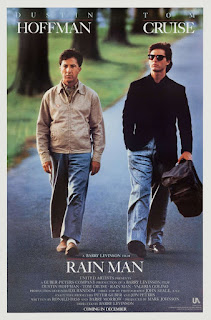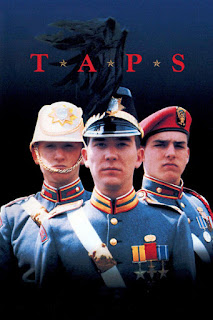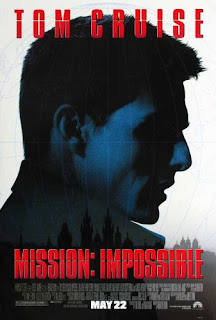Rain Man (1988)
Although Cocktail was a critical failure, it did little to harm Tom Cruise's career. This is largely due to the fact that five months later, Cruise's third attempt at an adult drama was released. At last, he had a critical and commercial hit with Rain Man.
Rain Man exists in the camp of former Best Picture winners that continues to be popular among modern audiences instead of fading into obscurity like a handful of other winners. It's easy to understand why it has been so long-lasting. The plot is hardly complex; it ventures little outside of a straight-forward representation of selfish yuppie Charlie Babbitt discovering that he has an autistic brother named Raymond after the death of his father. But the change in Charlie's character from self-centered to genuinely caring about his brother is heart-warming enough to win the favor of audiences even thirty years after its initial release.
It's for that reason that I feel a bit sorry to be critical of this film. Nothing about this film is grossly offensive, but there is some room to question the role that Raymond's autism plays in the story and Charlie's development. Dialogue about this very issue has been in motion for a while now, but it's always worth coming back to. Using someone's disability as a way to cure the personality flaws of someone without a disability is questionable, to say the least; it turns people with various disabilities into little more than plot points in the character development of somebody else. In a world where disability is so heavily stigmatized, this approach to disability in the media can have unintentional negative side effects. On the other hand, this film is the first to really put autism into the spotlight and successfully made Raymond the most human and sympathetic character through the juxtaposition of his brother's poor attitude towards life. So, like everything else, there's upsides and downsides; I don't feel too strongly about people who like this film or dislike it because of Raymond's autism. To each his own.
That being said, I find heart-warming films to be ultimately hit or miss for me. Rain Man does have some touching moments, like Charlie teaching Raymond how to dance and Raymond "saving" Charlie from the bathtub. I'm disheartened that I don't enjoy this film as much as others, which I think is more due to the fact that Charlie is too much of a jerk for too long. He exploits his brother nearly to the very end, when he suddenly has a change of heart that I still haven't quite fully understood. I'm glad others felt much more satisfied than I did, at least.
One thing that has definitely held up after all this time is Dustin Hoffman's Oscar-winning performance as Raymond. He's incredible enough that Cruise feels swept under the rug by comparison, but to say that he didn't also receive critical acclaim would be a massive understatement. Even though Cruise had already given a few solid performances in prior films, this was the first time he had experienced success on this scale. If Maverick from Top Gun kicked off Cruise's tendency to play cocky hot-shots, then Charlie Babbitt definitely cemented it. As unflattering as it can make it look, it's a role Cruise plays well. Charlie in particular is interesting when put into the context of Cruise's life.
Previously, I mentioned that Cruise took on the role of Maverick only a year after his abusive, estranged father died. The pressure that Maverick continued to feel because of his father even after his death felt quite similar to Cruise's reality. While Cruise claims he joined the Church of Scientology for his dyslexia, it was only after he joined that he began to speak more openly about his father, leading others (and myself) to speculate that his father was a large factor in why he became a Scientologist. Rain Man feels even more accurate to Cruise's life, as Charlie (born only a month after Cruise, per Raymond's information) has been estranged from his father since the age of 16 and shows little feeling but resentment after his death. Cruise's mother left his father when he was 10 years old, but if Andrew Morton's biography on him has any information worth trusting (and believe me, that book should definitely be read with a grain of salt), Cruise never had anything nice to say about his father afterwards despite interviews where he claims that he forgave him.
As Cruise never received formal acting education, and as he preferred to take a more method-acting sort of approach to prior roles, I think it's worth questioning his choice to play the same roles and the eerie ways they reflect his lived experiences. But this is a review of Rain Man, and Cruise's life is anything but feel-good.
Overall, if you enjoy road trips, brotherly love, jerk-turned-decent tropes, feel-good movies, or a mix of those things, Rain Man is worth checking out. The Tom Cruise psychoanalysis can be left to obsessive-compulsive losers like me.
Rating: 3.5/5 - March 5, 2020
Rain Man exists in the camp of former Best Picture winners that continues to be popular among modern audiences instead of fading into obscurity like a handful of other winners. It's easy to understand why it has been so long-lasting. The plot is hardly complex; it ventures little outside of a straight-forward representation of selfish yuppie Charlie Babbitt discovering that he has an autistic brother named Raymond after the death of his father. But the change in Charlie's character from self-centered to genuinely caring about his brother is heart-warming enough to win the favor of audiences even thirty years after its initial release.
It's for that reason that I feel a bit sorry to be critical of this film. Nothing about this film is grossly offensive, but there is some room to question the role that Raymond's autism plays in the story and Charlie's development. Dialogue about this very issue has been in motion for a while now, but it's always worth coming back to. Using someone's disability as a way to cure the personality flaws of someone without a disability is questionable, to say the least; it turns people with various disabilities into little more than plot points in the character development of somebody else. In a world where disability is so heavily stigmatized, this approach to disability in the media can have unintentional negative side effects. On the other hand, this film is the first to really put autism into the spotlight and successfully made Raymond the most human and sympathetic character through the juxtaposition of his brother's poor attitude towards life. So, like everything else, there's upsides and downsides; I don't feel too strongly about people who like this film or dislike it because of Raymond's autism. To each his own.
That being said, I find heart-warming films to be ultimately hit or miss for me. Rain Man does have some touching moments, like Charlie teaching Raymond how to dance and Raymond "saving" Charlie from the bathtub. I'm disheartened that I don't enjoy this film as much as others, which I think is more due to the fact that Charlie is too much of a jerk for too long. He exploits his brother nearly to the very end, when he suddenly has a change of heart that I still haven't quite fully understood. I'm glad others felt much more satisfied than I did, at least.
One thing that has definitely held up after all this time is Dustin Hoffman's Oscar-winning performance as Raymond. He's incredible enough that Cruise feels swept under the rug by comparison, but to say that he didn't also receive critical acclaim would be a massive understatement. Even though Cruise had already given a few solid performances in prior films, this was the first time he had experienced success on this scale. If Maverick from Top Gun kicked off Cruise's tendency to play cocky hot-shots, then Charlie Babbitt definitely cemented it. As unflattering as it can make it look, it's a role Cruise plays well. Charlie in particular is interesting when put into the context of Cruise's life.
Previously, I mentioned that Cruise took on the role of Maverick only a year after his abusive, estranged father died. The pressure that Maverick continued to feel because of his father even after his death felt quite similar to Cruise's reality. While Cruise claims he joined the Church of Scientology for his dyslexia, it was only after he joined that he began to speak more openly about his father, leading others (and myself) to speculate that his father was a large factor in why he became a Scientologist. Rain Man feels even more accurate to Cruise's life, as Charlie (born only a month after Cruise, per Raymond's information) has been estranged from his father since the age of 16 and shows little feeling but resentment after his death. Cruise's mother left his father when he was 10 years old, but if Andrew Morton's biography on him has any information worth trusting (and believe me, that book should definitely be read with a grain of salt), Cruise never had anything nice to say about his father afterwards despite interviews where he claims that he forgave him.
As Cruise never received formal acting education, and as he preferred to take a more method-acting sort of approach to prior roles, I think it's worth questioning his choice to play the same roles and the eerie ways they reflect his lived experiences. But this is a review of Rain Man, and Cruise's life is anything but feel-good.
Overall, if you enjoy road trips, brotherly love, jerk-turned-decent tropes, feel-good movies, or a mix of those things, Rain Man is worth checking out. The Tom Cruise psychoanalysis can be left to obsessive-compulsive losers like me.
Rating: 3.5/5 - March 5, 2020





Comments
Post a Comment